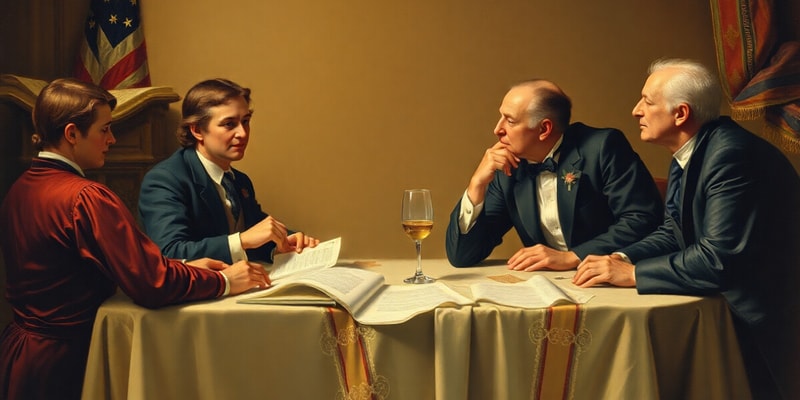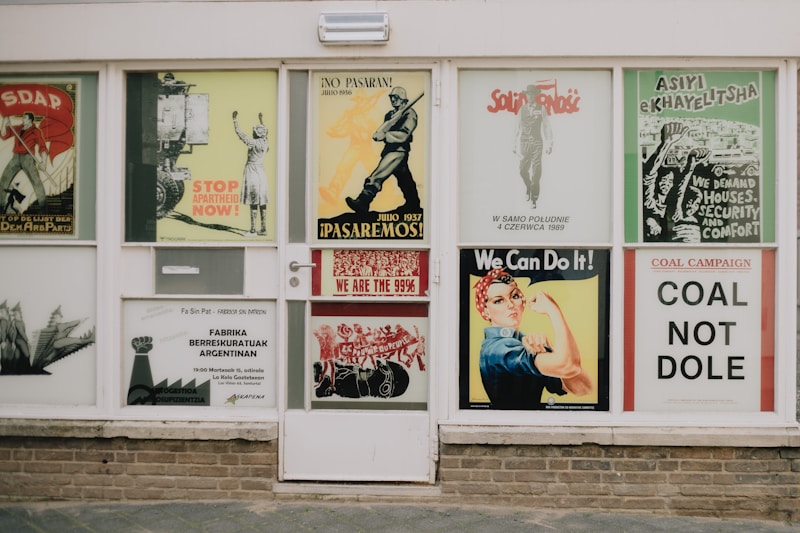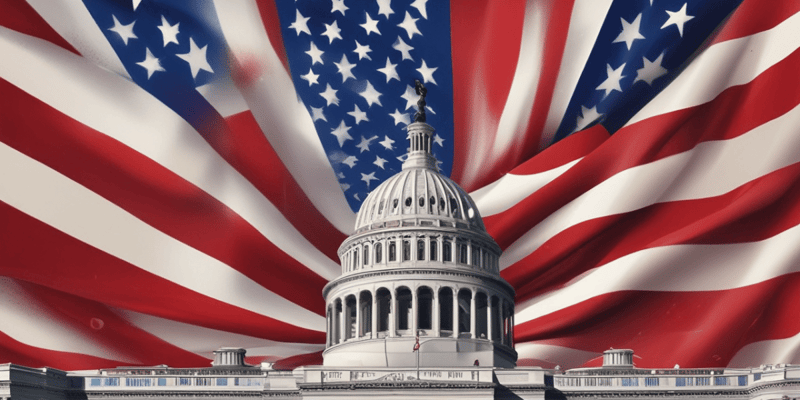Podcast
Questions and Answers
What is the purpose of electioneering in political parties?
What is the purpose of electioneering in political parties?
What is the function of party organizations like the Democratic National Committee?
What is the function of party organizations like the Democratic National Committee?
What term describes the declaration of a political party’s principles and beliefs?
What term describes the declaration of a political party’s principles and beliefs?
Which of the following describes the lowest level of party organization?
Which of the following describes the lowest level of party organization?
Signup and view all the answers
What role do elected officials play within political parties?
What role do elected officials play within political parties?
Signup and view all the answers
What is the main purpose of a national nominating convention?
What is the main purpose of a national nominating convention?
Signup and view all the answers
Who typically serves as delegates at a national nominating convention?
Who typically serves as delegates at a national nominating convention?
Signup and view all the answers
What determines how delegates must vote at the national convention?
What determines how delegates must vote at the national convention?
Signup and view all the answers
When is the general election held?
When is the general election held?
Signup and view all the answers
What unique aspect was considered when setting the date of the general election in 1845?
What unique aspect was considered when setting the date of the general election in 1845?
Signup and view all the answers
What is the primary role of county committees in the party system?
What is the primary role of county committees in the party system?
Signup and view all the answers
Which of the following is a key responsibility of state party organizations?
Which of the following is a key responsibility of state party organizations?
Signup and view all the answers
What is a distinguishing feature of national conventions for political parties?
What is a distinguishing feature of national conventions for political parties?
Signup and view all the answers
When do primary elections typically occur?
When do primary elections typically occur?
Signup and view all the answers
Which of the following describes a primary election?
Which of the following describes a primary election?
Signup and view all the answers
What can be said about states that use caucuses instead of primaries?
What can be said about states that use caucuses instead of primaries?
Signup and view all the answers
What term is used for electors who do not vote according to the popular vote of their state?
What term is used for electors who do not vote according to the popular vote of their state?
Signup and view all the answers
What is one consequence faced by electors in states without laws binding their vote?
What is one consequence faced by electors in states without laws binding their vote?
Signup and view all the answers
What principle contributed to the establishment of the Electoral College?
What principle contributed to the establishment of the Electoral College?
Signup and view all the answers
What is one role of electors in the Electoral College system?
What is one role of electors in the Electoral College system?
Signup and view all the answers
How did the Framers of the Constitution perceive the decision-making of the people?
How did the Framers of the Constitution perceive the decision-making of the people?
Signup and view all the answers
What does the term 'elector' refer to in the context of the Electoral College?
What does the term 'elector' refer to in the context of the Electoral College?
Signup and view all the answers
Which statement reflects a rationale behind the creation of the Electoral College?
Which statement reflects a rationale behind the creation of the Electoral College?
Signup and view all the answers
What best describes party identifiers in the context of political parties?
What best describes party identifiers in the context of political parties?
Signup and view all the answers
Which segment of political parties involves those who consistently support the party during elections?
Which segment of political parties involves those who consistently support the party during elections?
Signup and view all the answers
What is the primary function of the Democratic National Committee and the Republican National Committee?
What is the primary function of the Democratic National Committee and the Republican National Committee?
Signup and view all the answers
Which category best describes the lowest tier of political party organization?
Which category best describes the lowest tier of political party organization?
Signup and view all the answers
What role do elected officials play in the context of political parties?
What role do elected officials play in the context of political parties?
Signup and view all the answers
What is the primary responsibility of county committees within the party system?
What is the primary responsibility of county committees within the party system?
Signup and view all the answers
Which feature is essential for a national convention to officially declare a presidential nominee?
Which feature is essential for a national convention to officially declare a presidential nominee?
Signup and view all the answers
Why do primary elections vary in timing across different states?
Why do primary elections vary in timing across different states?
Signup and view all the answers
Study Notes
Political Parties in the US
- Two major political parties: Democrats and Republicans
- Purpose: Use the political system to achieve goals by controlling government.
- Engage in:
- Electioneering: Nominating candidates, coordinating campaigns, mobilizing voters
- Governing: Implementing their agenda by passing laws aligned with their party platform.
Party Segments
- Party Identifiers: Individuals who associate with a party due to shared values, culture, policies, or social networks.
- Party-in-the-Electorate: Voters who identify with a particular party and consistently vote for its candidates.
- Party Organizations: Formal structures like the Democratic National Committee and the Republican National Committee, managing party operations.
- Party in Government: Elected officials who hold key positions and make policy decisions.
Party Organization Structure
- Precincts: The lowest level of party organization.
- County: Considered the "workhorse" of the party system, responsible for voter mobilization, candidate training, and election poll work.
- State: Focus on recruitment, fundraising, party unification, and crafting state platforms.
- National: Responsible for presidential and congressional fundraising, coordinating national conventions, and promoting party nominees.
Choosing Candidates
- Primary Elections: Intra-party elections to select candidates for the general election (held between January-February to early summer).
- National Conventions: Formal conventions where delegates officially declare their presidential nominee (held every four years – 2024 Republican convention: July 15-18 in Milwaukee, Wisconsin; 2024 Democratic convention: August 19-22 in Chicago, Illinois).
General Election
- Held on the first Tuesday following the first Monday in November in even-numbered years.
- All candidates who won their respective primaries compete for office.
- Voters receive a single ballot with all candidates for each relevant office.
- Occurs every two years; presidential elections happen every four years.
The Electoral College
- After the general election, electors from each state meet to vote for president and vice president.
- Each state determines how electors are chosen (some use the popular vote – e.g., Texas), and electors are not legally bound to vote according to the popular vote.
- Electors formally cast their votes in December, and their decision can differ slightly from the popular vote.
- Faithless Electors: Electors who vote for someone other than their party's nominee (this is rare and has not changed election outcomes).
- The framers of the constitution established the electoral college to prevent decision-making based on emotion or charismatic demagogues.
- Electors are seen as more informed and reasoned in selecting a president than the general public alone.
Political Parties
- Groups with common interests that aim to influence government policies.
- Use the political system to achieve their goals.
- Participate in electioneering and governance.
Two-Party System in the US
- Dominated by Republicans and Democrats.
- Third parties exist, but their influence is limited.
Functions of Political Parties
- Electioneering: Nominating candidates, managing campaigns, and mobilizing voters.
- Governing: Implementing the party's agenda by passing laws aligned with their platform.
- Platform: A document outlining the party's principles, beliefs, and positions on public issues.
Segments of Political Parties
- Party Identifiers: People who identify with a particular party due to shared values, culture, policy preferences, or social networks.
- Party-in-the-Electorate: Voters who self-identify with a party and consistently vote for its candidates.
- Party Organizations: Formal structures like the Democratic National Committee and Republican National Committee, composed of paid operatives who manage the party infrastructure.
- Party in Government: Elected officials representing the party, responsible for governing and policy-making.
Levels of Party Organization
- Precincts: The lowest level of party organization.
- County: Considered the "workhorse" of the party system, primarily active during elections. Responsibilities include voter mobilization, candidate training, and election poll staffing.
- State: Focuses on recruitment for higher-level positions, fundraising, unifying the party, drafting a state platform, and holding state conventions.
- National: Responsible for fundraising for presidential and congressional campaigns, coordinating the national convention, and promoting the party's presidential nominee.
Choosing Candidates: Primary Elections
- Elections within political parties to select their candidates for the general election.
- Primary elections typically occur early in an election year, from January to February to early summer.
- Each state determines the rules for its primary elections, leading to variations in timing and voter registration requirements.
National Conventions
- Held in presidential election years to officially nominate the presidential candidate for each party.
- A candidate must win a majority of delegates at the national nominating convention to become the nominee.
- National Nominating Convention: An event where party delegates formally endorse the presidential nominee based on primary election results.
- Delegates: Party activists or leaders who represent their state or district at the convention based on primary results
General Elections
- The main election where candidates from different parties compete for office.
- Held on the first Tuesday following the first Monday in November of even-numbered years.
- All offices, including the presidency, are up for election.
The Electoral College
- A group of electors from each state who formally elect the president.
- The number of electors per state is determined by adding the number of its US Representatives and Senators.
- The District of Columbia (D.C.) has 3 electoral votes.
- To win the presidency, a candidate needs 270 out of 538 electoral votes.
Role of the Popular Vote
- The popular vote in each state determines which group of electors is chosen to vote in the Electoral College.
- The "winner-take-all" system applies in most states: the candidate who wins the majority of votes in a state receives all of that state's electoral votes.
Importance of the Electoral College
- The Electoral College was established by the Founding Fathers to ensure that all states, not just heavily populated ones, have a voice in choosing the president.
- It prevents the election of presidents who are only popular in large urban areas.
Arguments Against the Electoral College
- Some argue that it's undemocratic because a candidate can win the presidency without winning the popular vote.
- Critics also point out that it can disenfranchise voters in certain states.
Studying That Suits You
Use AI to generate personalized quizzes and flashcards to suit your learning preferences.
Related Documents
Description
Explore the structure and functions of major political parties in the United States, focusing on the Democrats and Republicans. This quiz covers party roles in electioneering, governance, and the various segments of party organization. Test your understanding of party dynamics and their impact on the political landscape.





